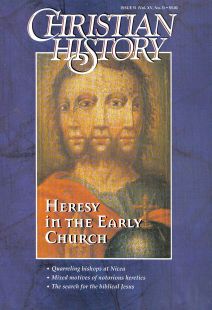Heresy in the Early Church: Did You Know?
THE THREE MAJOR CREEDS of the church are all misnamed. The Apostles’ Creed was not written by the apostles. What is called the Nicene Creed is not the creed that was produced at the Council of Nicea but a later creed. The Athanasian Creed has nothing to do with Athanasius and many have argued that it is not even a creed.
In the Nicene Creed, the key word used to describe Christ’s relation to God—homoousion, meaning, “of the same substance”—had been considered heretical a century earlier. Some earlier orthodox theologians argued that the term was not found in the Bible and that it blurred the distinctions between the Father and the Son.
Though the debate about Christ’s deity extended over centuries, the debate about the Holy Spirit’s divine nature lasted only about twenty years.
Some the greatest of early theologians were confused about Christ’s nature. Clement of Alexandria, for example, masterfully refuted the Gnostic heresy that said Christ did not have a real human body and therefore did not eat and drink. Clement held that Jesus did indeed eat and drink but not because he needed food and drink to stay alive—Jesus, Clement argued, only wished to keep his disciples from heretical beliefs about him.
Not all defenders of orthodoxy stayed orthodox themselves. Tertullian and Novatian, for example, two major anti-Gnostic theologians of the 200s, each fell out of favor with the church: Tertullian, because of his conversion to the Montanist heresy; Novatian, because of his unforgiving stance against those who had denied Christ under persecution.
For a time at Antioch, rival groups differed about the deity of the Holy Spirit. One group prayed, “Glory be to the Father and to the Son and to the Holy Spirit,” and the other one, “Glory be to the Father with the Son in the Holy Spirit.” The bishop managed to avoid offending either party by developing laryngitis at this point in the liturgy!
During his 45-year reign as bishop of Alexandria, Athanasius, the champion of Nicene orthodoxy, was exiled five times by five emperors, for a total of 17 years. Though his views on Christ’s deity were to become the official teaching of the church, when he died, it was still not clear his views would prevail.
Cyril of Alexandria, a fifth-century Greek bishop, held to the generally accepted belief that God is impassible—incapable of suffering or emotion. He equally held to the deity of Christ, who underwent his “passion” (i.e., his suffering) for us on the cross. This commitment led him to affirm that the eternal Word “suffered impassibly.”
Heretics often provided a great service to the church. For example, Marcion rejected the Old Testament and the Gospels of Matthew, Mark, and John, thus forcing the church to define the New Testament canon. Arius, in denying the deity of Christ, made the church articulate the doctrine that became the most crucial to Christianity.
By Tony Lane
[Christian History originally published this article in Christian History Issue #51 in 1996]
Tony Lane is director of research and senior lecturer in Christian doctrine at London Bible College. He is author of Exploring Christian Thought (Nelson, 1996) and a Christian History adviser.Next articles
Finding the Truth
How the earliest church decided Marcion and the Gnostics, among others, were wrong.
Justo González, Jr.Heresy in the Early Church: A Gallery of Malcontents for Christ
The mixed motives and odd teachings of four notorious heretics.
Stephen MillerRisky Lifestyles
It wasn’t just what Christians believed but also how they lived that concerned early church teachers.
Robert KruppHeresy in the Early Church: Christian History Interview — The Search for the Biblical Jesus
The hard, technical, theological work on Christ was essentially a 400-year Bible study.
Thomas OdenSupport us
Christian History Institute (CHI) is a non-profit Pennsylvania corporation founded in 1982. Your donations support the continuation of this ministry
Donate



